The 5 best solo board games
Because sometimes you want to play a board game, but you really don’t want to talk to anyone.
Board games are a fantastic avenue for socialization. I don’t think it gets much better than sitting around a table with close friends laughing, rolling, and often yelling at each other in good spirits. Unfortunately, life often conspires to prevent a regular game night. That’s where solo gaming fills the void. Here are the 5 games I’m most likely to grab off the shelf when I want to push some pieces around the table but can’t make it to game night.
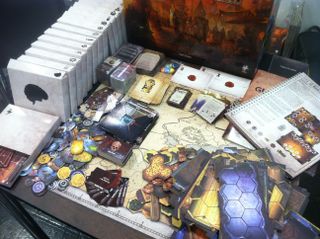
Gloomhaven
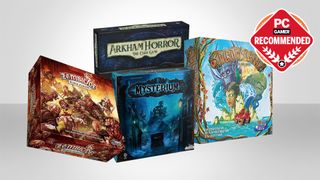
The best board games
Best cooperative board games
The best ways to play board games on PC
The 5 best solo board games
Gloomhaven has done nothing but garner praise since it appeared on the Kickstarter scene in late 2015. It quintupled its funding goal based on its promise of a near-living fantasy world packed with unique missions, a branching campaign, and light Legacy elements. It did more than deliver. It rocketed up BoardGameGeek’s rankings to land in the top spot in only a few months and a reprint Kickstarter raised 4 million dollars. This isn’t some miniature-filled hype machine—Gloomhaven deserves its accolades. A novel hand-management system pushes you through a scenario, leaving your character close to falling over just as you claim victory.
A campaign of Gloomhaven revolves around the titular city as much as it revolves around the players. It’s one of the few constants. Your players grow, level-up, and complete personal quests that cause them to retire. When this happens, a new class is unlocked and you can roll a new character to continue the game. Gloomhaven persists, however. The city itself can level up and provide new options, quests, and goods. Retired characters reappear via the event deck and choices you make at the end of a scenario will open or close future options. Gloomhaven is a massive game—hundreds of hours await—and you can’t even play everything in your first playthrough. It’s the closest the cardboard hobby has to Skyrim, and you can live in its world just as long.
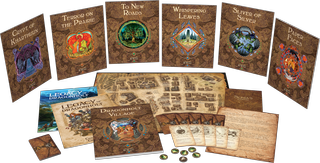
Legacy of Dragonholt
If Gloomhaven is Skyrim, Legacy of Dragonholt is board gaming’s Dragon Age. It’s the story of a band of adventurers summoned by an old friend to investigate a threat to the local ruling family. The line of succession is being challenged, and murder is afoot. The city of Dragonholt serves as a hub world of sorts. Each day you’ll wake and follow the story through a branching Choose-Your-Own-Adventure style paragraph system. This is no five dollar book-fair novel: there are thousands of entries in a vast system that spans multiple booklets.
Dragonholt is truly innovative. Character creation feels as rich as a paper and pencil RPG, and impacts the story in real ways without ever requiring the roll of a dice. Combat options differ if you’re a mage or a warrior, and enemy damage is tracked without ever doing math. Playing Dragonholt involves reading the booklets and occasionally marking out squares on your tracking sheet. These squares trigger if/then type statements that let you impact the story in ways both meaningful and minor. Flirt at just the right time and you may open up some romance options. Let the wrong main character die and the entire timbre of the town changes as you’re constantly forced to choose one of the “If Box V6 Is checked…” options. Along the way you’ll meet characters among the most diverse in the industry. This isn’t just a great game, it’s a great system, and I hope we see more from FFG.
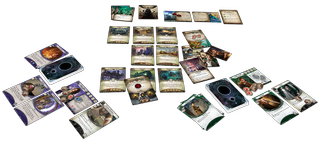
Arkham Horror: The Card Game
Narrative is something I want in any game I play. I’m not one for games of economic efficiency, where resources are described by the shape of their chits because engaging with the setting just gets in the way. The Arkham Horror Living Card Game (LCG) not only has a strong narrative, it’s made special by the way the mechanisms work in concert and reinforce that narrative. It’s ‘just’ a few decks of cards and piles of tokens, but the stories it weaves are so much more. The world feels real, lived in, and dreadful.
Like the other LCGs that Fantasy Flight has on the market, a game of Arkham Horror begins with building your deck. Each deck represents a character and their unique construction rules give them a very different flavor. Ashcan Pete—my favorite solo character—is a homeless drifter who wanders Arkham with his dog Duke. Ashcan can discard anything in his deck to re-use Duke’s abilities, reinforcing his lack of material attachments. He’ll get through the night with his trusty pup and a stiff upper lip. Decks also include weaknesses: The knowledge that these punishing effects may surprise you laces every draw with a sense of anxiety. When it happens as the locations you’re trying to reach flicker in and out of reality through the threat deck, you’ll understand why these characters go mad.
The biggest gaming news, reviews and hardware deals
Keep up to date with the most important stories and the best deals, as picked by the PC Gamer team.
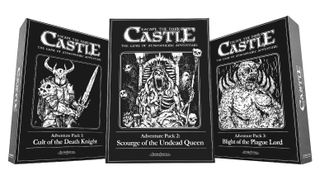
Escape the Dark Castle
Moody, evocative, and dark. Escape the Dark Castle is a fast paced game of fighting your way out of the clutches of an evil monster and it plays in about 30 minutes. The primary system is one of rolling dice with the hope to match a few symbols. Players—or just you—grab a prisoner and their unique set of dice. Each prisoner has a unique character die to represent their strengths and weaknesses. Set-up is as simple as dealing 15 cards out of a large deck to represent the castle and placing one of the dark bosses at the bottom.
Card by card you’ll work your way through the Dark Castle. There are horrific monsters to fight, NPC encounters to deal with, and tempting treasure that offer powerful benefits at high risk. All resolution is handled by rolling handfuls of dice, but the tension comes from the pressure of the unknown. Inevitably the next challenge is the one you least wanted to see, and the joy that comes from watching your weak shepherd crush an evil Necromancer’s skull on a lucky roll is real. I love this one to play over coffee in the morning, or to kill time between bigger games. I don’t always win, but every run through the castle is unique and memorable. Escape the Dark Castle is currently on Kickstarter seeking funds to reprint the original and add some expansions.

Escape from 100 Million B.C.
The last game on my list is a refreshing break from the doom and gloom of evil castles, dark cities, and eldritch horrors. Escape From 100 Million BC is a throwback adventure game from Kevin Wilson that lets you throw Abraham Lincoln into combat with dinosaurs, while you race to complete a time machine and return to the modern day.
A brightly colored board of hexes makes up the prehistoric land in which you crash. The goal is simple: rebuild the time machine without destroying the time stream. Dinosaurs are an ever-present threat. They can be killed—with the right weaponry—but doing so casts ripples through the time stream threatening the future you hope to return to. If that wasn’t enough, time portals dot the landscape disgorging everyone from Albert Einstein to Jeffrey “The Dude” Lebowski. These erstwhile travelers offer benefits to those who try to save them, but their untimely deaths will rapidly destabilize the time stream. While designed with modern sensibilities, Escape From 100 Million BC is replete with various decks and tokens that deal a zany story in bite sized pieces. It hovers close to the edge of clunky, but it’s worth seeking out this under-the-radar gem when you’re looking for a one-of-a-kind adventure.
Most Popular

